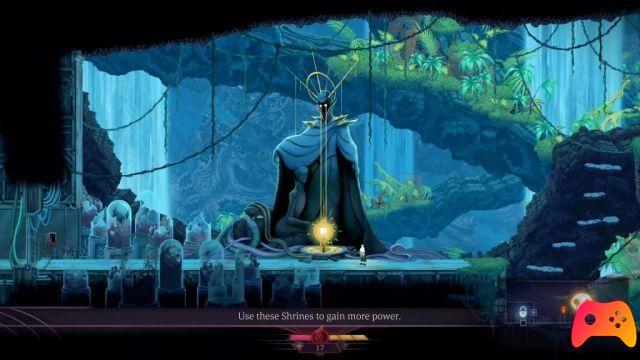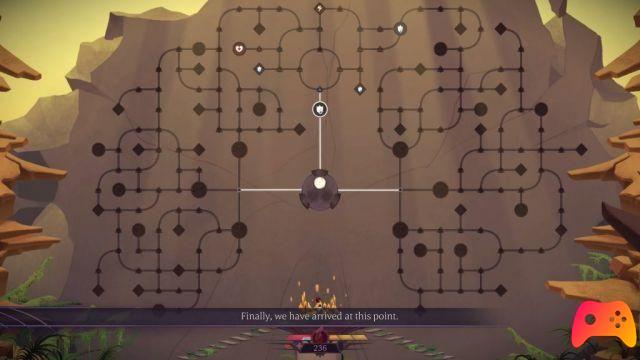
The kind of Metroidvania it has suffered a slow, inexorable decline over the years, mainly due to the advent of games in three dimensions; since the 2000s, however, the spread of indie titles has allowed a return of the flame, although their apparent simplicity of implementation has prompted many budding developers to try their hand at companies that later turned out to be bigger than them. SunderedFortunately for him, he seems to have escaped such a grim fate.

Born from a Kickstarter project successful, the new title of Thunder Lotus Games detaches himself from his older brother Jotun and abandons the isometry and mythological setting, focusing on much more disturbing and two-dimensional settings. The graphic style remains unmistakable, with sprites and backdrops made by hand with vivid colors, and smooth and well done animations.
Even the accompanying music is at an excellent level, they do not tire and perfectly render the mood of the story. This sees you as the protagonist Is that, a young woman who finds herself a prisoner of a distressing and dreamlike reality, populated by Eschaton, creatures "corrupted" by an ancient and mysterious entity, and by Valkyries, or the institution of the now fallen warriors who saved the world on the surface from the Eschatons and the Terror that manipulated them.

While exploring the three macro-areas constituting Sundered, Eche will come into contact with information regarding both factions; the outcome of their never-ending battle, as well as the end of the game, will be influenced by the choices that the girl will make during her journey. In particular, the determining factor is its degree of corruption and acceptance of the mysterious power that was - very suspiciously - granted to her at the moment of her awakening.

Advancing between colossal bosses and ruthless minibosses, in fact, Eche will get seven new skills, including a protective shield, double jump and a cannon, great for devastating hordes of enemies; the player can then choose whether to keep these powers unaltered or to exploit the power contained in Ancient Fragments, altering one or more of them into a more powerful "dark" version. Needless to say, it will be the more or less bright path undertaken by the protagonist that will determine the conclusion of the events.

Despite the nature of an independent game, Sundered has little to envy to the titles developed by the majors: the controls are responsive and link together very well, making possible skill combos at the same time as Eche's quick moves. There is a tree upgrade system for stats and skills, whose individual perks are unlocked with experience accumulated by defeating enemies.
Leveling gives its satisfaction, progress is gradual but well balanced. Unfortunately, the same cannot be said of the hordes of enemies that, as dynamically generated, are sometimes too overwhelming and almost impossible to subjugate. The complicity of this unpleasant situation is the semi-procedurality of maps, original mechanics compared to the classic metroidvania and which demonstrates the desire to dare by Thunder Lotus Games.

The result convinces and does not convince: the “important” areas for the rest of the story are always the same; to change (at each death of the player or restart of the game) are only the "rooms" around. This, combined with the non-fixed spawn of the enemies, causes a certain repetition in the intermediate sections, which are not very varied, as well as a "roll of the dice" effect rather alien to the nature of metroidvania.
If, on the one hand, the procedurality keeps Sundered "fresh" even after several hours of play, on the other it could annoy, as prevents players from optimizing the necessary backtracking and memorizing the maps, deprives them of many potential secrets and, what's more, it takes away a big chunk of level design, that constituted by the placement of enemies within the levels.

In short, it is about an undoubtedly interesting roguelike component, but which deserved a more careful study, with a greater variety of possible "rooms" and less aggression of the enemies, which, as already mentioned, in some cases are simply unbeatable due to a random and unhappy conformation of the level ... which is a shame, given that all Immutable sections, including boss fights, are instead extremely pleasant and (not surprisingly) much less "dishonest" than the hordes encountered during the exploration.

Definitely a popular element in an indie title, Sundered provides one localization of menus and subtitles in numerous languages; at launch the game is already in its second update (v. 1.04): this shows a concrete willingness on the part of the developers to offer the best possible experience right away. The latest patch nearly eliminated frame rate dips, although they are still present occasional (and annoying) mini freezes who, with their abundant second in duration, can decree defeat in such a dynamic title.
Same goes for i crashes, very frequent before the patch and now rare, but not absent; all that remains is to hope that in the next few days Thunder Lotus Games will do its utmost to completely eliminate these problems.

Sundered is an atypical metroidvania, with too few imperfections to be considered a great game, but full of excellent ideas, represented with a particular and inspired design. The plot itself, however cryptic, manages to intrigue from the very first moments, while the gameplay is initially rather cumbersome, becoming satisfying and dynamic only after unlocking a couple of skills. The balance of many sections seems to be left a little too much to chance and too little to a "reasoned" difficulty, but for the type of audience it aims at (and for the certainly affordable cost of 19,99 Euros), Sundered manages to entertain , fascinate and infuriate in equal measure.






